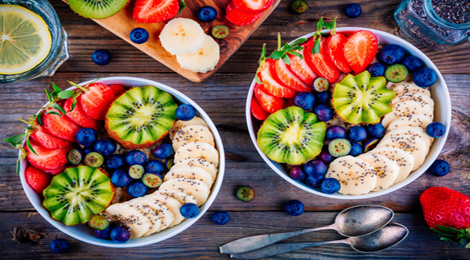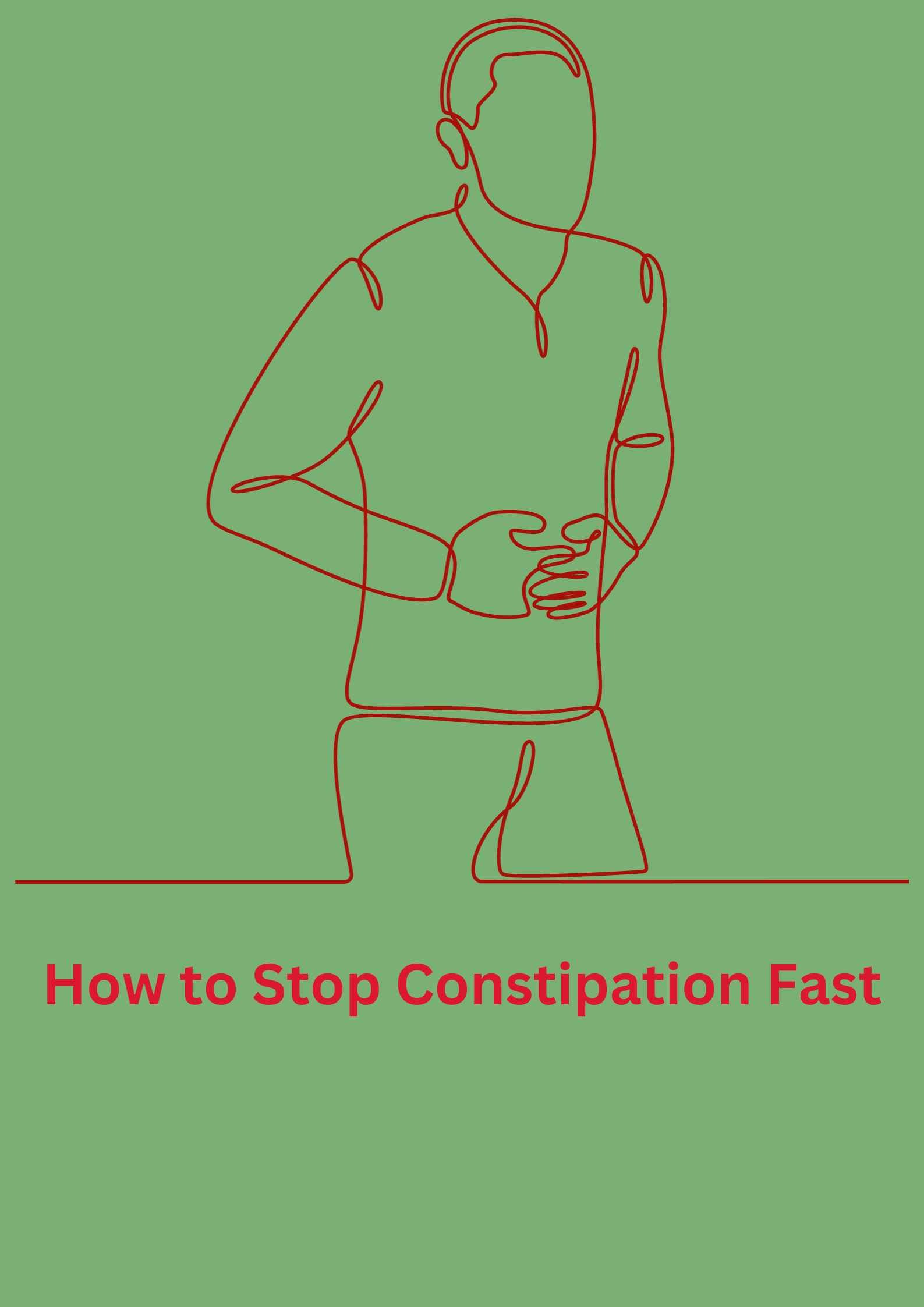How to Stop Constipation Fast?:
How to Stop Constipation Fast, incorporate foods high in fiber and water into your diet, such as whole grains, beans, lentils, fruits, vegetables, nuts, and high-fiber fruits like apples, prunes, pears, kiwis, and citrus. Eating ripe fruits like peaches, apricots, and pears and drinking plenty of fluids like water or vegetable/fruit juices can also help relieve constipation quickly.
Avoiding foods that contribute to constipation, like processed foods, dairy products, and foods low in fiber, is also beneficial. Additionally, consider taking dietary fiber supplements, staying hydrated, and incorporating osmotic laxatives, stool softeners, lubricants, and stimulant laxatives as needed for constipation relief.
Increase Dietary Fiber Intake
When it comes to finding fast relief from constipation, one of the most effective strategies is to increase your dietary fiber intake. Fiber not only adds bulk to your stool, making it easier to pass, but it also helps regulate bowel movements and promotes a healthy digestive system. Incorporating fiber-rich foods into your diet is a natural and safe way to alleviate constipation and maintain regularity.
Incorporating Fiber-rich Foods In Your Diet
Adding fiber-rich foods to your daily meals is an excellent way to combat constipation. Here are some options to consider:
Whole grains for improved bowel movements
Whole grains, such as oats, brown rice, and whole wheat bread, are excellent sources of dietary fiber. They not only provide essential nutrients but also promote improved bowel movements. Try replacing refined grains with whole grain alternatives to help prevent and relieve constipation.
Beans and lentils for added fiber and bulk
Beans and lentils are packed with fiber and can be a great addition to your diet. They are not only rich in fiber but also provide essential minerals and vitamins. Incorporate options like kidney beans, chickpeas, and lentils into your meals to increase your fiber intake and promote healthy digestion.
Fruits and vegetables for natural relief
Including a variety of fruits and vegetables in your daily diet is key to combating constipation. Fruits like apples, berries, and pears, and vegetables such as broccoli, spinach, and carrots are excellent sources of dietary fiber. These natural and nutritious options can help relieve constipation and support overall digestive health.
Nuts for a healthy and satisfying snack
Adding nuts to your diet can provide both fiber and healthy fats, making them a satisfying and nutritious option for relieving constipation. Almonds, walnuts, and pistachios are examples of nuts that are high in fiber and can help promote regular bowel movements. Enjoy them as a snack or sprinkle them on top of salads and yogurts for an extra fiber boost.
Incorporating these fiber-rich foods into your diet can provide fast relief from constipation and help maintain regularity. Remember to gradually increase your fiber intake and drink plenty of fluids to support the digestion process. Try to include a variety of these foods in your meals for optimal results.
Hydration For Regularity
Looking to stop constipation fast? Incorporate foods that fight constipation, such as high-fiber fruits like apples, prunes, pears, and kiwis. Hydration is also important, so be sure to drink plenty of fluids like water and vegetable or fruit juices.
The Role Of Water In Preventing Constipation
Water plays a crucial role in maintaining regularity and preventing constipation. When you’re dehydrated, the large intestine absorbs more water from the stool, making it hard and difficult to pass. By staying well-hydrated, you can ensure that your stool retains enough moisture, keeping it soft and easy to eliminate.
Importance Of Staying Hydrated Throughout The Day
Staying hydrated throughout the day is essential not only for overall health but also for preventing constipation. It’s recommended to drink at least eight glasses of water per day, but individual needs may vary depending on factors such as activity level and climate. Adequate hydration helps to maintain the body’s water balance and supports optimal digestion.
Drinking Water, Fruit Juices, And Herbal Teas For Optimal Digestion
When it comes to optimal digestion and preventing constipation, choosing the right beverages can make a significant difference. Here are some options to consider:
- Water: Drinking plain water throughout the day is the most important aspect of staying hydrated. It is calorie-free and easily accessible, making it an excellent choice for promoting regularity.
- Fruit Juices: Some fruit juices, such as prune juice, pear juice, and apple juice, can have a mild laxative effect due to their natural sugar and fiber content. These juices can help stimulate bowel movements and relieve constipation.
- Herbal Teas: Certain herbal teas, like peppermint tea and ginger tea, have been found to aid digestion and alleviate constipation. These teas can have a soothing effect on the digestive system, promoting regular bowel movements.
Remember, it’s important to choose natural and unsweetened options whenever possible to avoid excess sugar intake, which can have adverse effects on digestion.
Natural Laxatives To Promote Bowel Movements
How to Stop Constipation Fast: Constipation can be an uncomfortable and frustrating experience. It’s important to find natural ways to promote regular bowel movements and ease the discomfort. One effective method is incorporating foods that act as natural laxatives into your diet. These foods are rich in fiber and have properties that stimulate the digestive tract, facilitating smooth bowel movements.
Incorporating Foods That Act As Natural Laxatives
Ripe or dried fruits such as peaches, apricots, and pears
Kiwi as a stimulant for the digestive tract
Oranges for their high water content and natural fiber
Eating high-fiber fruits like apples, prunes, pears, kiwis, and citrus can help relieve constipation. The fiber present in these fruits adds bulk to the stool, making it easier to pass through the digestive system.
Furthermore, ripe or dried fruits such as peaches, apricots, and pears are excellent sources of fiber and are easily digestible. Including these fruits in your diet can provide relief from constipation.
Another natural laxative to consider is kiwi. This small, tangy fruit contains actinidin, an enzyme that helps break down proteins in the digestive tract. Kiwis are also packed with fiber, which promotes regular bowel movements and helps prevent constipation.
Oranges are known for their high water content and natural fiber. Including oranges in your diet can add bulk to the stool and facilitate smoother bowel movements. Moreover, the citrus content of oranges stimulates the digestive tract and aids in digestion.
In conclusion, incorporating foods that act as natural laxatives into your diet is a simple and effective way to promote regular bowel movements and prevent constipation. Try including high-fiber fruits like apples, prunes, pears, kiwis, and citrus in your meals. Additionally, consider including ripe or dried fruits such as peaches, apricots, and pears, as well as kiwi and oranges, to stimulate the digestive tract and ease the discomfort of constipation.
The Brat Diet For Constipation Relief
The BRAT diet, which includes bananas, rice, applesauce, and toast, is a well-known and effective dietary approach for relieving constipation. This diet primarily consists of bland, low-fiber foods that are gentle on the digestive system, making it ideal for individuals experiencing constipation or diarrhea.
Overview Of The Brat Diet (bananas, Rice, Applesauce, And Toast)
The BRAT diet is a simple, easy-to-follow regimen that focuses on easily digestible foods. Let’s take a closer look at each component of the diet:
- Bananas: Bananas are a great addition to the diet as they are rich in potassium, which helps regulate bowel movements. They also contain dietary fiber, which aids in promoting regularity.
- Rice: Plain white rice is low in fiber and gentle on the digestive system, making it a suitable choice for individuals with constipation. It helps add bulk to the stool, promoting easier passage.
- Applesauce: Unsweetened applesauce is another component of the BRAT diet that is gentle on the stomach and assists in relieving constipation. It contains pectin, a soluble fiber that aids digestion and promotes regular bowel movements.
- Toast: Plain white toast is easy to digest and can help provide relief from constipation. It is advisable to opt for whole grain bread if your body tolerates it well, as it contains more fiber.
Benefits Of The Brat Diet For Constipation And Diarrhea
The BRAT diet offers several benefits for individuals experiencing constipation or diarrhea:
- Gentle on the stomach: The bland and simple nature of the BRAT diet makes it easy to digest, reducing the strain on the digestive system.
- Low in fiber: When dealing with constipation, a low-fiber diet can help alleviate symptoms. The BRAT diet’s focus on low-fiber foods can aid in regulating bowel movements.
- Provides essential nutrients: While the BRAT diet may be low in certain nutrients, it can still provide essential vitamins and minerals. However, it is important to reintroduce a balanced diet gradually after constipation resolves.
Incorporating Other Foods Into The Brat Diet For Balanced Nutrition
While the BRAT diet is effective for short-term relief, it is essential to reintroduce a wider range of foods to ensure balanced nutrition. Here are some suggestions:
- Fluids: Adequate hydration is crucial for maintaining regular bowel movements. Include water, herbal teas, and clear broths.
- High-fiber fruits and vegetables: Gradually incorporate fiber-rich foods like berries, prunes, spinach, and broccoli into your diet to support healthy digestion.
- Lean proteins: Include lean sources of protein such as chicken, fish, tofu, and legumes in your meals to promote overall nutritional balance.
- Whole grains: Introduce whole grain options like brown rice, whole wheat bread, and quinoa to increase your fiber intake and aid in regular bowel movements.
Remember, consult with a healthcare professional or registered dietitian before making any major changes to your diet, especially if you have any underlying health conditions or concerns.
Alternative Treatments For Constipation
Looking for alternative treatments for constipation? Incorporating high-fiber foods like whole grains, beans, lentils, fruits, vegetables, and nuts can help alleviate constipation and promote healthy digestion. Additionally, eating ripe or dried fruits and drinking plenty of fluids can provide fast relief for constipation.
Say goodbye to constipation with these natural remedies!
Understanding Alternative Methods To Alleviate Constipation
Constipation is a common digestive issue that can cause discomfort and disruption to one’s daily routine. While dietary changes can play a significant role in relieving constipation, alternative treatments can also provide effective relief. These alternative methods focus on improving gut health, incorporating probiotics, using herbal remedies, and adopting physical activities like yoga. Let’s explore each of these methods in more detail:
The Role Of Probiotics In Improving Gut Health
Probiotics are beneficial bacteria that promote a healthy balance in the gut flora. They can aid in digestion and relieve constipation. Including probiotic-rich foods in your diet, such as yogurt, kefir, and fermented vegetables, can help regulate bowel movements and improve overall gut health. Additionally, you can consider taking probiotic supplements recommended by a healthcare professional.
Herbal Remedies Such As Senna And Aloe Vera
Herbal remedies have been used for centuries to alleviate constipation. Senna, a natural laxative, can stimulate bowel movements and provide quick relief. Aloe vera, known for its soothing properties, can also act as a natural laxative and promote regularity. However, it is important to consult a healthcare professional before using herbal remedies to ensure proper dosage and avoid any potential side effects.
Yoga And Physical Activity For Promoting Digestion
Engaging in physical activities such as yoga, stretching, and regular exercise can help promote digestion and relieve constipation. Certain yoga poses, such as the Cat-Cow pose and Pawanmuktasana (wind-relieving pose), can stimulate the abdominal muscles and facilitate bowel movements. Additionally, incorporating regular physical activity into your routine can improve overall gut health and alleviate constipation.
By understanding and incorporating these alternative treatments, individuals experiencing constipation can find relief and promote healthy digestion. Remember to consult with a healthcare professional before trying any new treatments to ensure their suitability for your specific needs.


Credit: www.piedmont.org
Dos And Don’ts For Constipation Relief
Looking for fast relief from constipation? Incorporate high-fiber foods like whole grains, beans, fruits, and vegetables into your diet. Stay hydrated and consider using natural laxatives such as kiwi fruit or fiber supplements to alleviate discomfort. Avoid foods that can exacerbate constipation, and opt for a diet that promotes healthy digestion.
Tips For Preventing Constipation Through Lifestyle Changes
Constipation can be a frustrating and uncomfortable condition. Fortunately, there are several lifestyle changes you can make to help prevent constipation and achieve regular bowel movements. By incorporating these dos and don’ts into your daily routine, you can find relief from constipation quickly:
Ensuring Regular Exercise And Physical Activity
Regular exercise and physical activity play a crucial role in maintaining healthy digestion and preventing constipation. Engaging in moderate-intensity activities such as walking, jogging, or cycling can help stimulate the muscles in your intestines and promote bowel movements. Aim for at least 30 minutes of exercise each day to keep your digestive system functioning optimally.
Avoiding Certain Foods That Can Worsen Constipation
The foods you eat can either alleviate or worsen constipation. To prevent constipation, it is important to avoid certain foods that can contribute to digestive issues. Here are some foods you should consider reducing or eliminating from your diet:
- Processed foods: These foods are typically low in fiber and high in fat, which can slow down digestion and lead to constipation.
- Refined grains: White bread, pasta, and rice lack the fiber content that aids in bowel movements. Instead, opt for whole grains like whole wheat bread, brown rice, and whole grain pasta.
- Fast food: Burgers, fries, and other greasy fast food options can be difficult for your body to digest, leading to constipation.
- Dairy products: Consuming excessive amounts of dairy products can cause constipation in some individuals. If you notice that dairy affects your digestion, try reducing your intake or opting for lactose-free alternatives.
- Red meat: Red meat is notoriously difficult to digest, so it’s best to limit your consumption or opt for leaner cuts of meat.
- Caffeine: While a morning cup of coffee can provide a temporary laxative effect, excessive caffeine intake can lead to dehydration and worsen constipation. Avoiding excessive caffeine from coffee, tea, and energy drinks can help regulate bowel movements.
By making these dietary adjustments, you can help prevent constipation and maintain a healthy digestive system. Remember to drink plenty of water throughout the day to keep yourself hydrated, which is also essential for combating constipation.
How to Stop Constipation Fast: Constipation can be managed effectively through simple lifestyle changes. Incorporating regular exercise into your routine and being mindful of the foods you consume can make a noticeable difference in your digestive health and overall well-being. By adhering to these dos and don’ts for constipation relief, you can stop constipation fast and enjoy regular bowel movements.
Frequently Asked Questions Of How To Stop Constipation Fast? foods To Fight Constipation
What Foods Help Immediately With Constipation?
To relieve constipation immediately, try incorporating high-fiber foods into your diet. The BRAT diet, including bananas, rice, applesauce, and toast, is a recommended option. Other foods like blackberries and raspberries, whole grains, beans, lentils, fruits, vegetables, and nuts can also help.
Remember to stay hydrated and consider taking fiber supplements or using laxatives if needed.
What Relieves Constipation Immediately?
Here are some top ways to relieve constipation immediately:
1. Increase dietary fiber intake. 2. Take fiber supplements. 3. Stay hydrated. 4. Use osmotic laxatives. 5. Try stool softeners. 6. Consider lubricants. 7. Use stimulant laxatives. 8. Consider using an enema.
How Do You Stop Urgent Constipation?
To stop urgent constipation, follow these tips:
1. Increase dietary fiber intake. 2. Take fiber supplements if needed. 3. Stay hydrated. 4. Try osmotic laxatives or stool softeners. 5. Use lubricants or stimulant laxatives if necessary. Remember to consult a healthcare professional for severe cases or persistent constipation.
What Foods Are Natural Laxatives?
Foods like blackberries, raspberries, and high-fiber fruits such as apples, prunes, and pears can act as natural laxatives to relieve constipation. Incorporating whole grains, beans, lentils, fruits, vegetables, and nuts into your diet can also help prevent constipation. Stay hydrated and consider fiber supplements if needed.
Conclusion
How to Stop Constipation Fast: To stop constipation fast, it’s important to include fiber-rich foods in your diet. Fruits like apples, pears, kiwis, and citrus, as well as high-fiber options like whole grains, beans, lentils, and vegetables, can help alleviate constipation. Additionally, drinking plenty of fluids and staying hydrated is crucial.
Avoiding constipating foods and opting for natural laxatives can also provide relief. By making these dietary adjustments and following the right remedies, you can keep constipation at bay and maintain healthy digestion.

